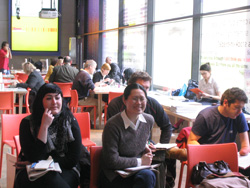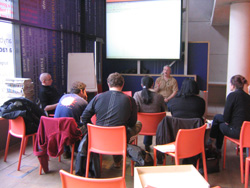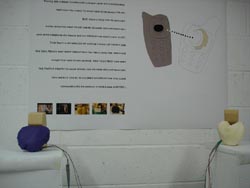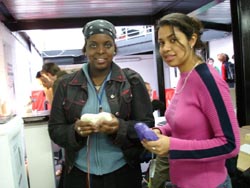

 subscribe
subscribeI am exploring the possibilities offered by networked media for communication and collaboration, investigating models, platforms and tools that can foster greater understanding and increased connection between groups and individuals. I intend this to have a positive impact at several levels: in the communities themselves, in the understanding they develop and in the model/s that this provides.
Ultimately I am interested in facilitating the development and spread of systemic, progressive ideas / models that can co-exist with and challenge dominant ideologies and myths and the common sense of 'public opinion'. Related to this I will use ideas from Gramsci, Barthes, Latour and others.
Stanford avatar Lawrence Lessig gave a talk at Second Life. Alter ego ing a special avatar created for this event, Professor Lessig spoke about his entertaining book, Free Culture - The nature and future of creativity (first published in 2004), and asked for feedback on virtual worlds from the attendees. But.... but oh no, also places at the virtual symposia had to be pre-booked, with seats reserved for journalists and bloggers, how challenging and creative these remarketing ideas are. Lawrence Lessig is professor at Stanford Law School and the founder of the Stanford Centre for Internet and Society. The author of The Future of Ideas and Code: And Other Laws of Cyberspace, he is the chair of the Creative Commons project. Journalist mister Linden covers the session on his site see and lick link's.


I've now run 2 out of our 3 workshops at the Takeaway Festival which is all going by in a bit of a blur, especially after a stimulating but exhausting evening of lectures and discussions - some of which happened over a pint or two of lager. The discussions in the workshops have been really useful - I didn't know what to expect at all before hand. They've confirmed that there's a growing interest in blogging and the possibilities of new (user generated) media generally and that this comes from lots of (sometimes conflicting) perspectives.
NEW SEARCH IN THE NEW WORLD ! www.zofox.com :: Zofox Advertising
It does not matter whether you believe in the future or not – the future will come, want it or not. But the formation of the future is in your hands!
Zofox is a Future Interactive Portal, which is designed by the wish of internet visitors.
I recently came across a movie about "Trusted Computing" that in my opinion is worth mentioning here.
The basic message is "why trust the industry if they do not trust their customers?" The movie is nicely animated and obviously origins in the anti tcpa movement. By Benjamin Stephan and Lutz Vogel
(Their server is a bit slow, so I have put a copy of the medium size file on the MA Rave College network, however, you can also use the torrent file.)
It seems clear that the first epoch of the 3rd Millennium, the Network Age, was already asserting itself in increasingly powerful ways by the early 1990s, if not sooner, through the literal reorganization of the social, political, and economic infrastructure around electronic networks.[1] Samuel R. Smith
Ideas and discussions about networks and complexity are increasingly important among the most diverse communities. These range from hippies to hard-nosed business people and from radical activists to right wing reactionaries and all shades of opinion in between. The discussions range from visions of a collaborative heaven to a hell filled with terrorists, paedophiles and copyright pirates.
Whatever the vision, most seem to start from the assumption that networks are in some way a new phenomenon or at least that they are much more significant now than ever before. They are seen as either the product of, or at least encouraged by, the recent explosive growth of digital media and particularly the internet. Few commentators on the subject explore the nature of networks, except to provide a small number of examples that suit their argument.


Tc/N Tactile communication is an interactive networked sculpture installation that allows people to communicate physical touch through the interface of heart, a physical input and output that has not been made exchangeable with current communication devices.The installation consists of two sides that communicate to each other over the internet.
The goal of the project is to make transportation of touch in networked communication possible, to remind people that natural physical input and output of human expression are essential key to communication, which may result in better and more sensational understanding of one another.
Pervasive Connections was an event organised by SPACE Media Arts and Iniva 'focusing on opportunities for artists to work with new social technologies'. The day comprised of presentations, workshops and panel discussions and tickets were sold out, mainly to artists, arts organisers and producers. Let's Do Lunch by Take2030 which 'tracks Hackney's public access wireless nodes and its lunch menus along bus route 26 in the form of a series of documentary videos' was also installed in the Space gallery.
A recurring theme was artists' arguably halting adoption of wireless and locative technologies and the lag in their response to the cultural questions and opportunities they give rise to. Peter Chauncy, Space's wireless specialist and organiser of Bow Wireless Festival, pointed out that artists working with new and networked media are not necessarily in communication, either with each other or with the technical development communities, who have been hard at work in the capital for many years now.
Alexie Blinov (one of the Take2030 crew) expressed his frustration at many artists' reluctance to engage with the technology on a practical level, to even start to read technical instructions and more generally their defeatist and phobic attitudes in the face of unfamiliar terminology.